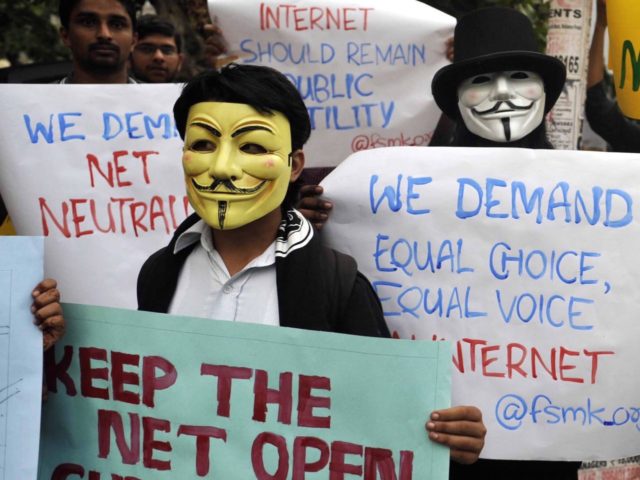On Tuesday, the D.C. Circuit Court of Appeals handed down a 2-1 decision upholding the 2015 Federal Communications Commission (FCC) decision to impose “Net Neutrality” on Internet service providers, treating the Internet like a public utility.
The controversial policy was enacted last year, much to the delight of Google, of left-wing activists in Silicon Valley, and of their White House allies. It was a reversal of FCC chair Tom Wheeler’s stance, and was carried out with little transparency.
However, few of the activists could explain why Net Neutrality — which prevents providers from charging differential rates for differential bandwidth use — is necessary, beyond vague notions of “equality.” The same tech entrepreneurs who decried government regulation of free speech, and organized opposition to the Stop Online Privacy Act (SOPA), seemed to have no problem with the government regulating the Internet itself. Their attempts to defend the policy often proved embarrassing. And in the months since the policy was enacted, investment in broadband has dropped, along with Silicon Valley job growth.
Congress never authorized the FCC to regulate the Internet, and expressed its opposition to such regulation, but the FCC went ahead anyway, using old legislation, such as the Communications Act of 1934, which had been passed to regulate telephone monopolies.
Two liberal judges on the D.C. Circuit ruled that the FCC had the authority to do so; the dissenting conservative judge allowed that the FCC had the authority, but defied its own rules in doing so, particularly in proving a basis for the change, pointing out that the FCC had relied on laws designed to decrease regulation in order to increase it.
The issue will now pass to the Supreme Court. It is a reminder that the future of the Internet depends on the November election, for three reasons: 1. The next president will appoint the ninth member of the Court, and probably more; 2. the next president will either help Congress repeal Net Neutrality, or resist; 3. The next president will either give up American control of domain names, or keep it.
Petitioner Daniel Berninger, who had appealed the case to the D.C. Circuit, warned that Tuesday’s decision could have dire consequences for entrepreneurship. “Today’s decision is a huge step backward for the continued evolution of the internet that consumers enjoy today … This convoluted legal opinion ignores the reality that the internet prospered for 20 years without FCC policy intrusions. The rules upheld today essentially render new innovations for consumers and businesses that otherwise could have come to market dead on arrival.”
It may take the Supreme Court — or the voters — to intervene.
Joel B. Pollak is Senior Editor-at-Large at Breitbart News. His new e-book, Leadership Secrets of the Kings and Prophets: What the Bible’s Struggles Teach Us About Today, is on sale through Amazon Kindle Direct. Follow him on Twitter at @joelpollak.


COMMENTS
Please let us know if you're having issues with commenting.